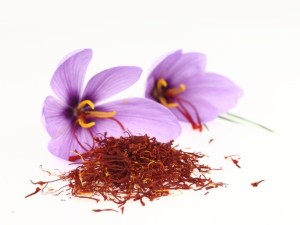Saffron is a plant. The dried stigmas (thread-like parts of the flower) are used to make saffron spice. It can take 75,000 saffron blossoms to produce a single pound of saffron spice.
Contents
Uses
- Saffron is used for asthma, cough, whooping cough (pertussis), and to loosen phlegm (as an expectorant). It is also used for sleep problems (insomnia), cancer, “hardening of the arteries” (atherosclerosis), intestinal gas (flatulence), depression, Alzheimer’s disease, fright, shock, spitting up blood (hemoptysis), pain, heartburn, and dry skin.
- Women use saffron for menstrual cramps and premenstrual syndrome (PMS). Men use it to prevent early orgasm (premature ejaculation) and infertility.
- Saffron is also used for to increase interest in sex (as an aphrodisiac) and to induce sweating.
- Some people apply saffron directly to the scalp for baldness (alopecia).
- In foods, saffron is used as a spice, yellow food coloring, and as a flavoring agent.
- In manufacturing, saffron extracts are used as fragrance in perfumes and as a dye for cloth.
Benefits
Saffron Extract Can Prevent Over-Eating
Saffron extract, a natural spice use for seasoning, fragrance, due and medicine for over three millennia, will annihilate your urge to over-eat. Though Dr. Oz had never heard of this miracle appetite suppressant before, he revealed how saffron extract prevents over-eating, which is (of course) related to weight gain. According to a study in Whole Foods Magazine, 100 percent of women who took the saffron extract supplement reported decreased hunger.
Saffron Extract Combats Emotional Eating
Emotional eating is a huge factor in weight gain for many people, triggered by chemicals in the brain. According to Life Extension, compulsive eating occurs in 30 percent of obese women, though its prevalence in the general population reportedly exceeds even this number.
A saffron extract supplement will go into your intestinal system, go into your brain and stimulate the same feeling an emotional eater would get from eating, say, carbohydrates. It gives you that feeling of relief without that short-term hit from the carbohydrates. So, when you see food, you don’t have to put it in; you don’t feel addicted to put it in there. You have the ability to say ‘no.’
Proven Results
The studies involving saffron extract that Dr. Oz looked at allowed participants to eat whatever they wanted; and the results were clear. They snack significantly less and they lost body weight even though they were allowed to eat whatever they want, he said. When I hear that, that’s a wakeup call for me.
Dr. Oz and his team performed the study themselves with two volunteers who tried the saffron extract supplement over one weekend to see if it curbed their appetites. Both women were self-proclaimed emotional eaters.
It Is Natural
Saffron extract is a natural supplement, made from the saffron crocus. The dried stigmas, threadlike parts of the flower, are used to make saffron spice. According to WebMD, saffron has been used to help alleviate a number of ailments aside from over-eating including: asthma, cough, sleep problems, hardening of the arteries, intestinal gas, depression and heartburn. It has also been used as an aphrodisiac.
Other appetite suppressants are man-made. Phentermine is one sort of appetite-suppressant drug approved by the FDA as a short-term weight loss aid.
No Calories!
The saffron extract supplement has no calories. However, Dr. Oz noted that prospective users must look for a special blend called Satiereal. This particular variation was used in the studies Dr. Oz looked at. Those studies called for 88-90 mg, twice a day.
Satiereal is a clinically studied, proprietary extract of saffron. According to Healthy Body Daily, in clinical studies, women taking Satiereal experienced:
- 100% reduction in the desire to snack
- 50% fewer instances of eating between meals
- Less hunger
- Moderate weight loss
- More energy
- Better mood
Cautions
- Pregnancy and breast-feeding: Taking saffron by mouth in amounts larger than what is normally found in food is LIKELY UNSAFE. Larger amounts of saffron can make the uterus contract and might cause a miscarriage.Not enough is known about the safety of using saffron during breast-feeding. Stay on the safe side and avoid use.
- Bipolar disorder: Saffron seems to be able to affect mood. There is a concern that it might trigger excitability and impulsive behavior (mania) in people with bipolar disorder. Don’t use saffron if you have this condition.
- Allergies to Lolium, Olea (includes olive), and Salsola plant species: People who are allergic to these plants might also be allergic to saffron.
- Heart conditions: Saffron might affect how fast and how strong the heart beats. Taking large amounts of saffron might worsen some heart conditions.
- Low blood pressure: Saffron might lower blood pressure. Taking saffron might make blood pressure become too low in people with low blood pressure.
Interactions
- We currently have no information for saffron Interactions. Please consult with your doctor!
Other names
Autumn Crocus, Azafrán, Azafron, Croci Stigma, Crocus Cultivé, Crocus sativus, Indian Saffron, Kashmira, Kesar, Kumkuma, Saffron Crocus, Safran, Safran Cultivé, Safran Espagnol, Safran des Indes, Safran Véritable, Spanish Saffron, True Saffron, Zafran
References
Source: WebMD, http://www.webmd.com/vitamins-supplements/ingredientmono-844-saffron.aspx?activeingredientid=844&activeingredientname=saffron

